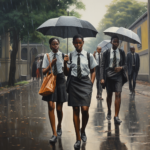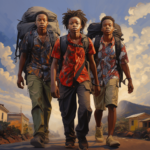—
Echoes of Hard Times
The year was 2014, and I was in my third year at the university studying accounting.
The previous year had been turbulent, with a series of killings by the infamous Boko Haram sect. Many prayed and hoped the new year would usher in laughter in replacement for the sorrows experienced in 2013.
The hope was dashed when two hundred and seventy-six girls got kidnapped from their school at night on the 24th of April, 2014.
Nigeria was set in darkness, and a new enemy was created.
This was an enemy to life in itself. The nation witnessed the disparity in unity and the question of loyalty.
It was a time when activists were born. It was a time when people realized how much the girl’s freedom to educate was threatened. It was a global call that got the response of world leaders.
The unfortunate incident had taken place in the northeast of Nigeria, but Lagos, where I was felt the heat,
Pupils in Lagos State feared for their fellow pupils in Borno State who were kidnapped, while their parents feared for their future.
It was a time that introduced the ‘Bring Back Our Girls’ campaign.
Unfortunately for the political elites, it was time to manipulate the credulity of innocent Nigerians in the forthcoming national elections.
The university’s journal published the various views held by the students of the university.
I quite disagreed with the article written on the last page affirming that a student’s view was a general view.
I approached the editor and requested that the article be pulled from the school’s journal.
The editor agreed to it if only I could challenge the article by writing a feature to disagree with what was published.
That was how I got an entry on the student board of editors after submitting the features.
Life on campus became easier as I started writing about almost everything.
After the second semester’s examinations, I took a short visit to go see my family at Falomo.
My mother had informed me of my stepfather’s illness and said he was getting better after being treated by a local nurse. The polytechnic where my stepfather taught owed its staff five months salaries. Mother’s Shop was no longer run as she had become a full-time housewife.
I met my stepfather in his personal chair, looking pale. He wore his glasses like he often did, leaving them sagging on his nose.
The man in his frailty had a book in his hands, which he evidently had just started reading.
“Good afternoon, sir,” I greeted her, kneeling down.
“Oh!” He exclaimed, happy to see me.
“I see an old soldier never retires,” I said, grinning.
“A man of knowledge never retires; he only renews himself,” he said, stretching his hand for a handshake.
‘What a man,’ I sighed.
“And how do you feel, sir?”
“You should know that when it’s time for a child to crawl, we create an enabling environment, and when he is to walk, we give him our hands just so he can rise whenever he falls. But when it is time to fly and the child refuses to do so, we push such a child to take the risk for himself.”
Also Read JOAN The Writer -The Good Samaritan
“Welcome, Joan. Go to your room and rest, and we shall discuss better later,” he said with his eyes back to his book.
“I shall see what you’ll eat,” the mother said.
The prevailing situation took me back to when we acted out a play in Senior Secondary School 3 titled ‘The Echoes of Hard Times,’ by Felicia Onyewadume.
There we were acting based on a written script, but here we were in 2014, facing the reality of hard times.
Jordan skipped his law school for a year and took up a teaching job in one of the private secondary schools in Ikoyi.
Mother needed an extra hand financially, and he decided to make that sacrifice for the family.
Ibitayo this time was already a young boy of 8 years who attended St. Matthias Primary School, Lafiaji, Lagos Island.
This was my stepfather’s alma mater. He wanted his son to also attend there, even though the proximity was an issue for the family.
While we had one thing or another to handle as individuals, as families, and as a nation, we found strength in one another’s resilience.
Stepfather’s colleague and friend, Mr. Durojaiye, at that time, became a succor to the family.
After spending several dollars at the Lagos State University Teaching Hospital, Ikeja, and meeting appointments with various recommended doctors, there was no significant improvement. We then moved my stepfather to a private clinic in Yaba for full treatment.
Mr. Durojaiye, who had been a victim of medical negligence at the teaching hospital, did his best to ensure that no one passed through what he did. And as such, not only did he make financial provisions for the family, his presence was comforting to my stepfather.
Tough times, they say, do not last, but tough people do.
With the passage of time came strength and a renewal of hope. Within a few months, my stepfather was back on his feet.
Mother decided to get back to business. She had stayed at home for too long and felt it was time to be productive once again.
This time around, she went for something she had always admired but never done.
She started her personal catering services, which she called ‘Mama J’s Catering Services.’
The catering services were launched with six female workers who enrolled in the classes in a big but moderately spaced apartment in Grace’s plaza, Thom Jones.
It was a service that catered to both local and interstate events.
Once again, Mother fared well with business as she had done before, but this time Justina wasn’t around to assist her like she did years ago.
My stepfather went back to work, and with some help from friends, Jordan was able to attend the Nigerian Law School in Abuja.
Years after being called to bar, Jordan became a barrister and worked for a private law firm in Wuse, Abuja.



